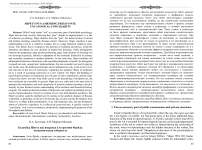Shpet's pun amending Freud's wit: uncanonical conciliarity
Автор: Markov Alexander V., Kolotaev Vladimir A.
Журнал: Новый филологический вестник @slovorggu
Рубрика: К 90-летию Ю.В. Манна
Статья в выпуске: 3 (50), 2019 года.
Бесплатный доступ
While Freud claims “wit” as a necessary part of individual psychology, Shpet answers him covertly, believing that “pun”, despite its capriciousness, is a fact of collective psychology. Shpet deduces from the “pun”, the initial mixture of sacred and profane meaning, especially Russian culture. Moreover, Shpet visualizes a pun, understanding it not as a collective mistake, but as a stage theatrical collective experience. This allows him to contrast to the doctrine of reception and device, which the formalists developed, the new doctrine of theatre-like directing, which distinguishes between the preparatory stage and the performing stage. Such doctrine of directing was not developed specially, limited to adaptation of the scholastic distinction of primary and secondary intentions to modern aesthetics. At the same time, Shpet combines old philosophical doctrine of intentions with a peculiar philosophy of speech: he distinguish in speech not only concept and implementation, but also semantic core and its playing out. In this case, the dialectical principle can be attributed not only to the level of content, but also to the level of expression, explaining the aesthetic effects of modernist art as a result of accepting expression as a new content. For Shpet, life-buildung or para-religious projects of modernism are only part of such a substitution, and the study of puns thus shows not only what shifts can be in the functioning of modernist art, but how modernist art is possible in general. Shpet acts as a critic and at the same time as apologist for modernism, and such complexity of position without resorting to his philosophy of puns blocked correct understanding of his aesthetic and theoretical-literary program. The radical polemical position of Shpet does not explain immediately his persuasive theatricalization of puns as creation of new non-individualistic aesthetics. But Shpet’s position could be clarified now by turning to the aesthetic disputes of Russian symbolism, in particular, on the level of obscene pun. It turns out that the thinkers from Solovyov to Shpet differed profanation in an individualistic pun, and the theatricalization of collective experience in a collectively perceived pun. A specific version of “conciliarity” now is to be reconstruct, productively supplementing the proposals of the Slavophiles and Bakhtin.
Wit, pun, freud, shpet, solovyov, psychoanalysis and literature, technique, theatricalization, individualism, conciliarity (collegiality), intention
Короткий адрес: https://sciup.org/149127202
IDR: 149127202
Список литературы Shpet's pun amending Freud's wit: uncanonical conciliarity
- Шпет Г.Г. Сознание и его собственник // Шпет Г.Г. Философские этюды. М., 1994. С. 20-116.
- Шпет Г.Г. Введение в этническую психологию // Шпет Г.Г. Philosophia Natalis. Избранные психолого-педагогические труды / отв. ред.-сост. Т.Г. Щедрина. М., 2006. С. 417-500.
- Шпет Г.Г. Очерк развития русской философии. Пг., 1922.
- Шпет Г.Г. К вопросу о гегельянстве Белинского // Шпет Г.Г. Очерк развития русской философии. II. Материалы / [реконструкция, науч. ред., коммент., археограф, работа Т.Г. Щедрина]. М., 2009. С. 100-184.
- Шпет Г.Г. Эстетические фрагменты. Пг., 1923.
- Freud S. Wit and its relation to the unconscious. London et al., 2014.
- Tihanov G. Gustav shpet: Literature and aesthetics from the Silver Age to the 1930s // Primerjalna književnost. 2006. Т. 29. №. 2. P. 1-19.
- Seifrid T. Sign and/vs. essence in Shpet // Gustav Shpet's Contribution to Philosophy and Cultural Theory. West Lafayette, Ind., 2009. P. 181-191.
- Wundt W. Völkerpsychologie, 10 Vols. Leipzig, 1900-1920.


